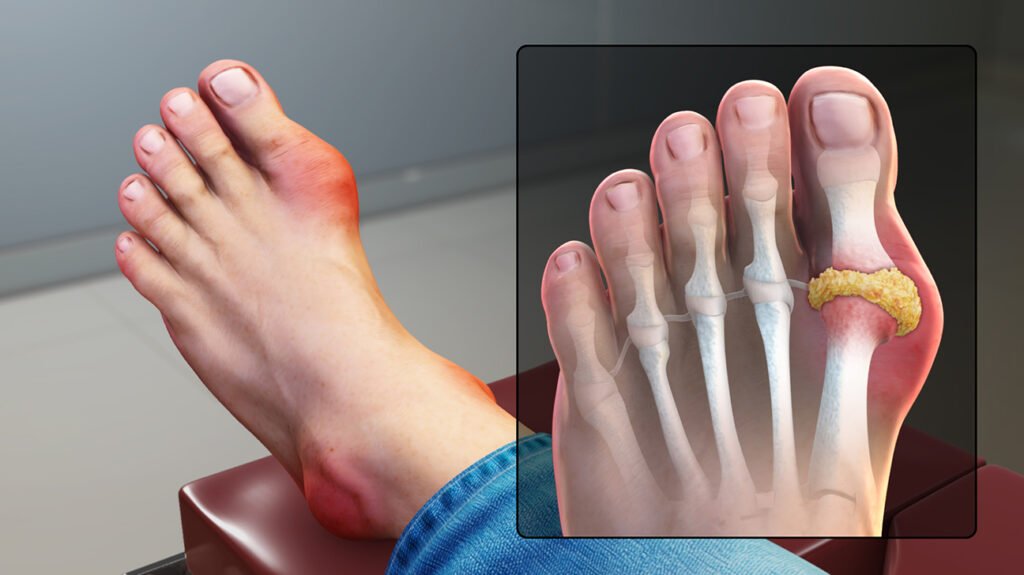Gout Treatment in Pune
Gout is one of the leading causes of joint inflammation among adults. Small uric acid crystals form in and around the joint, causing redness, pain and swelling. These crystals are made of body’s normal waste products, uric acid. Normally the body removes extra uric acid through the kidneys into the urine. However, this does not happen fast enough in people with gout. This causes uric acid levels to build up and the crystals to form.

What is Gout?
Gout is a type of arthritis that occurs when excess uric acid starts depositing in the joints, causing pain, redness, warmth and swelling. Gout can impact a variety of joints, including the ankles, knees, elbows, and wrists, but most commonly the metatarsal-phalangeal joint (MTP), where the big toe connects to the foot Uric acid precipitates into crystals at cooler temperatures. Since the big toe is farthest from the heart, it’s often cooler than the other parts of the body, making gout more likely to occur at this site.

What are the Symptoms of Gout?
An attack of gout usually comes on very quickly. The joint becomes very red, swollen and extremely painful. Often the joint is very painful to touch. Typically, Gout affects one joint at a time, often the joint of the big toe. Other joints, such as the knees, ankles and elbows, can also be affected by gout. Patients don’t get any symptoms in between the attacks.
Gout is extremely painful. The first and most common symptom of gout is sudden and severe pain in a joint, often the big toe joint. Seventy percent of first gout attacks are in the big toe.
How is Gout Diagnosed?
Gout is diagnosed by finding crystals of uric acid in fluid taken from your joint.
Uric acid levels can be measured by blood tests; however, these are not always accurate. Uric acid levels may be normal or even lowered during an attack or gout. High uric acid levels without clinical features of gout does not mean patient has gout. Blood tests can be requested to rule out other types of arthritis or infections. X-rays are often normal in the early stages so are not very useful in diagnosing gout.
What are the risk Factors for developing Gout?
Gout is usually caused by kidneys not flushing uric acid out quickly enough. There are some lifestyle factors which may increase your risk of developing gout, including:
- drinking alcohol
- Dehydration (not drinking enough water)
- being overweight or overeating
- Eating excess non-vegetarian foods
- Taking diuretics (water tablets)
- Having kidney disease also increases your risk of developing gout.
- Sugary drinks
What are the complications of Gout?
In some cases, gout can turn out to be more serious conditions, such as:
Kidney stones: If urate crystals collect within the urinary tract, they might also become kidney stones.
Recurrent gout: Most people may have regular recurrences, causing gradual damage to the joints and surrounding tissue and some may only ever have one flare-up.
Can Gout Be Prevented?
To lower the risk of the development of gout, patients can take several steps.
Alcohol: Cut down the amount of alcohol you drink and avoid drinking a lot of alcohol at one time (binge drinking).
Weight loss: If you are overweight, lose weight gradually.
Make sure you have a healthy diet as ‘crash’ or ‘starvation diets can actually increase uric acid levels. See a dietitian for advice.
Changes in your diet: It is believed that some foods may trigger attacks of gout. These foods tend to contain high levels of purines, a substance that can be made into uric acid in the body. However, not all purine-rich foods are thought to cause gout.
How is Gout Treated?
Several medications are available for gout treatment, including oral steroids, non-steroidal anti-inflammatory drugs (NSAIDs), and Colchicine, a medication that decreases the severity of gout flare-ups.
- Nonsteroidal anti-inflammatory drugs (NSAIDs). NSAIDs may control inflammation and pain in people with gout.
- Diet modification can lower uric acid levels and reduce the risk of future attacks
- Medications that reduce uric acid levels.
- Medications that improves uric acid removal.
Dr. Pravin Patil, Rheumatologist is one of the best doctors for gout treatment in Pune. He has vast experience of treating patients with gout for last several years.
